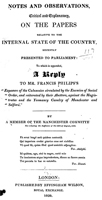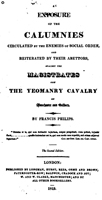
The Peterloo Massacre - Manchester 16th August 1819
TRANSCRIPTION OF : 'NOTES & OBSERVATIONS, Critical & Explanatory, on the Papers Relative to Page 184-188 A REPLY, Mr. Philips, alluding to the loss of lives on the 16th of August, asks, (page 5l,) "Where is the Briton, a magistrate, a constable, a soldier, or a citizen, that does not sincerely lament each of these calamities?" I presume Mr. Philips means this interrogation to be taken abstractedly, for I do not suppose that the person, who on quitting the field, (page 24,) " went up to an officer of the Manchester Yeomanry, whom he knew, and thanked him from his heart for the admirable conduct of his corps ;" and who afterwards in "writing to distant friends an account of the proceedings of the day, expressed in each letter the most unqualified approbation of the sound judgment displayed by the Magistrates, and the excellent conduct of the Manchester Yeomanry" - I say, I cannot suppose that such a person, so expressing himself, could feel any absolute regret at those fatal results which he considered almost "miraculously" few, and which, therefore, were the unavoidable consequence of the "sound judgment" of one party, and the "excellent conduct" of another, to neither of whom had he any "idea that blame could possibly attach." Mr. Philips says, (page 26,) "A cause must be a bad one, that requires the slightest reservation; one that would stand in need of such a subterfuge, if I know myself, I should be the last to defend." For the sincerity with which Mr. Philips makes this statement, I give him full credit; but I yet am unable to reconcile it with the interrogation, (page 5I,) "ls the wilful and premeditated murder of Campbell, the constable, under circumstances of barbarous atrocity, to be regarded as nothing?" It is diflicult to conceive, unless it be that all Mr. Philips's information in this case is derived from the Manchester Chronicle, that he could be ignorant that, hours before Campbell was attacked, he had been firing a pistol loaded with ball, into the street. As I have noticed this case at length, in my comments on the parliamentary papers, it is not necessary to repeat the particulars here. I am as much disposed to lament the death of Campbell as Mr. Philips can be; but be it remembered, that it happened subsequent to the attack made upon the people on the 16th of August, and that the declarations of the mob, who assailed him, pointed to some supposed violence of which he had been guilty on that day. It is perfectly ludicrous to see Mr. Philips assert, (note, page 53,) that "the Radicals studiously conceal, or make light of, every death or wound occasioned by the regulars." I am not aware, that the death of any person wounded on the 16th, has been more spoken of, than that of Joseph Whitworth, of Hyde; with the exception of that of John Lees, which excited more attention on account of the inquest. But when he speaks of the "total dereliction of feeling in those who have been so clamorous about the lives which were lost on the 16th of August," he had better have established the truth of his assertion, on the authority of some few of his "innumerable proofs," than have excused himself from it on the stale plea, that it would be "a waste of time." Mr. Philips says, in reference to the Lancaster and Chester Grand Juries, (page 54,) that " the lists of their distinguished names, given in the Appendix, No. 19, will, to every intelligent or liberal mind, convey the assurance, that the liberty of the subject could not have been intrusted to safer hands." The question is not about the liberty of the subject, but the impartial and due discharge of their own definite functions; viz. to decide rightly, whether by the ex-parte evidence of the prosecutor, such a prima facie case is made out, as that the accused person shall be called upon to answer the charge. Now, knowing as I do, the positive evidence which was submitted to the Grand Jury, having myself seen and heard the testimony of several persons who were examined before them, my opinion as to their conduct certainly will not be changed by any reference to "their distinguished narnes." Mr. Philips describes as fully, and decides as directly and unhesitatingly, upon Meagher's case, as though he had been present, and seen the whole affray. I cannot, however, give him credit for entire accuracy. The evidence being positive, as to the wounding of the two poor men, by Meagher, it was unquestionably the imperative duty of the Magistrates to have committed him for trial. It certainly was not proved, that he ever was assaulted, though it was sworn that one or two of his men were. That occurrence, however, took place hours before the firing. He also fired three times, instead of twice, as Mr. Philips intimates. And let it be remembered, that though his landlord swore to the fact of stones being thrown before Meagher fired, he would not swear that any windows were broken before that time. And with respect to the breaking of the lamp, the evidence was positive that that was done by Meagher himself. Where the whole proceedings on the part of the defendant in court, were contrary to law (and that they were so, I believe no lawyer of character in the kingdom will deny,) it is useless to start particular objections. But it was impossible to be present during the examination, without seeing that the whole police of the town was enlisted on the side of the prisoner.*1 And several of the prosecutor's witnesses were threatened by some of the police runners, in order to prevent their coming forwards. As a precedent, (if it would ever be permitted to form one,) this case is most seriously injurious.*2 lt completely abrogates and supersedes the functions of a jury ; and though the wounded men may still indict, the prisoner would go into court, not upon the intrinsic merits of the case, but with the fact, that the Magistrate, after hearing evidence on both sides, had dismissed the charge completely in his favour. I object too (if after stating the fundamental and absolute impropriety of the conduct pursued, it be worth while to mention a minor circumstance,) to the personal competency of the individual by whom this decision was made, as I cannot but think that a gentleman who had to be taught at an expense of some hundreds of pounds, that a potatoe was a vegetable, is not very well qualified duly to appreciate the force and bearing of evidence *3, and consequently not fit to act in propria persona as a jury. Whatever degree of guilt may attach to the Radicals, (page 55) for presuming to disbelieve that Nadin was shot at, I confess myself to be equally implicated. I cannot think that any person intending to hurt him, would have aimed at his head; or that, the pistol being fired so close to him, as that the flash from it (note, page 53) should "burn the fur on his hat," he could have escaped being wounded. I very much question whether there are in the town more than about fifty persons, including Mr. F. Philips and sundry old women, who are not sharers in the blame of my obstinate incredulity upon this subject. I have, except when I have been immediately replying to some observations of Mr. Philips's, confined my notice of the conduct of the magistrates and municipal authorities, to what took place previous to the 10th of August. Into subsequent matters I have not yet entered. But in order to afford a proof how very distant their conduct is from that of cool, cautious, and unprejudiced, persons, I shall remind my readers that on the 17th of August, which was Tuesday, and consequently the principal market day in Manchester for cotton goods, &c.; one of the constables came upon the exchange about eleven o'clock, and in the utmost agitation ordered that the room should be closed, and declared the town and neighbourhood in a state of open rebellion. Footnotes~~~~~~~~~~~~~~ *2. An attempt has been made, to quote this case as a precedent already. In the Dublin Evening Post, of Nov. 23rd, 1819, will be found, the examination of a person named Smith, on a charge of stealing money from a collection-box, at a charity sermon. From the report, it appears that the accused was a warden of the church, where the transaction occurred; and upon the examination his counsel wished to produce proofs of his insanity. This being resisted by the counsel who appeared for the prosecution, Mr. Perrin, the prisoner's counsel, quoted the case of Meagher, to prove his right to give evidence in defence upon the examination before a Magistrate. - Counsellor Greene, for the plaintiff, then said, "If the ease be as has been stated, I declare, for my part, that the proceedings are, in my opinion, illegal, and against the law and constitution; that the Magistrates have usurped the power of a petit jury - a power that not even a grand jury have any control over," &c. *3 On the fifth of October, I was in court at the New Bailey, during part of Meagher's examination. It was of course to be expected, from the circumstances of the case, and from the hour at which the outrage occurred, that the witnesses would be of the working classes. They were so. Several had been already examined, and another, a female, had just entered the witnesses box, when the magistrate for a short time left the bench. A lusty man in black, who had the appearance of a gentleman, was standing near me, when looking towards the witness he addressed a genteel looking person at my right hand; "See, see, there's another of them: what a parcel of d___d raggamuffin scamps these witnesses are. If he had shot a whole troop of them, he would have done no harm, by God." This observation, which made my blood boil, was assentingly received by the person to whom it was addressed. Had the magistrate been upon the bench, I should have spoke to him, and stated the language I had heard uttered; but belbre he returned, the person had left the court. During the woman's examination, she made an assertion which seemed not to please the gentleman. to whom the brutal speech I have quoted was made. Upon which he cried out, "eh! what a d__n__n lie!" I afterwards discovered that this was the very respectable witness, Mr. Davis, as Mr. Wright called him, who swore that when he heard the stones thrown at Meagher`s windows he was "on his knees at prayer in, a back room," which looked quite the opposite way from Meagher's lodgings. ***************************************************************
'NOTES & OBSERVATIONS, Critical & Explanatory, on the Papers Relative to the Internal State of the Country, Recently Presented to Parliament; to which is appended, a REPLY to Mr. Francis Philips's 'Exposure of the Calumnies circulated by the Enemies of Social Order ...' Transcribed by Sheila Goodyear 2019 LINK to full .pdf document of 'Notes & Observations ...'
on the Internet Archive website to read or download. |
||||||||||||||||||||||||||||||||||||||||||||||||||||||

